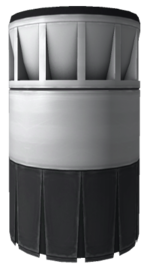J-X4 "Whiplash" Turbo Ramjet Engine
| J-X4 "Whiplash" Turbo Ramjet Engine | ||
| Jet engine by C7 Aerospace Division | ||
| Radial size | Small | |
| Cost | (total) | 2 250.00 |
| Mass | (total) | 1.800 t |
| Drag | 0.2 | |
| Max. Temp. | 2000 K | |
| Impact Tolerance | 7 m/s | |
| Research | | |
| Unlock cost | 18 000 | |
| Since version | 0.15 | |
| Part configuration | jetEngineTurbo.cfg | |
| Maximum thrust | 130.00 kN | |
| Isp | (max) | 4000 s |
| Fuel consumption | 0.66 | |
| Intake air consumption | 5.30 | |
| Thrust vectoring | 1 ° | |
| Electricity generated | 5.0 ⚡/s | |
| Testing Environments | ||
| On the surface | Yes | |
| In the ocean | Yes | |
| On the launchpad | Yes | |
| In the atmosphere | Yes | |
| Sub-orbital | Yes | |
| In an orbit | No | |
| On an escape | No | |
| Docked | No | |
| Test by staging | Yes | |
| Manually testable | Yes | |
The TurboJet Engine is an air-breathing engine. These require liquid fuel from tanks and constant supply of intake air using air intakes inside an oxygenated atmosphere. Note, intakes collect air and send it to jet engines regardless of where the intakes are on the craft; fuel, however, flows automatically only from the same stage as the engines.
Usage
The TurboJet Engine's thrust varies with its speed. It produces maximum thrust at 1000 m/s, 50% thrust while stationary, and produces no thrust at 2400 m/s or above. The Basic Jet Engine produces more static thrust, but the Turbojet engine rapidly overtakes the basic jet engine. The turbojet has a much lower specific impulse at lower altitudes and is heavier by 0.2 tons.
It is extremely useful for SSTOs and demonstrated to be faster and more fuel efficient, partnered with Rockomax 48-7S rocket engines, than the hybrid aspirated rocket R.A.P.I.E.R. Engine.[1]. It is possible, however, that the R.A.P.I.E.R. engine is more efficient for vehicles with extremely high mass ratios, however, at that point, it makes more sense to go with a combination of 48-7S rockets and other, high-specific-impulse rockets for deep space.
Product description
| “ | A highly advanced turbine engine using space-grade materials for very high performance. This new model features the latest in thrust vectoring and compression technology. This engine is designed to operate best at higher altitudes and speeds, and engineers from C7 Aerospace assured us all those leaks stop once it gets up there. | ” |
Created by: C. Jenkins
Trivia
The internal part's name is turboFanEngine which is another kind of jet engine. In real life, a turbojet engine's fan pulls all the air from the intake through a combustion chamber, as opposed to a turbofan in which some of the air sucked in bypasses the chamber and is shot out of the back without being burned at all. The turbojet is more efficient at high speeds and in thinner atmospheres, although turbofans are much quieter and are very efficient when moving slowly. This is why turbofans are almost exclusively fitted on commercial airliners, and turbojets are more common on supersonic planes.
Changes
- Initial Release
References
- ↑ “KSP V.23 -Vid#65- SPACE RACE . No Mods.” by YouTuber vaos3712
